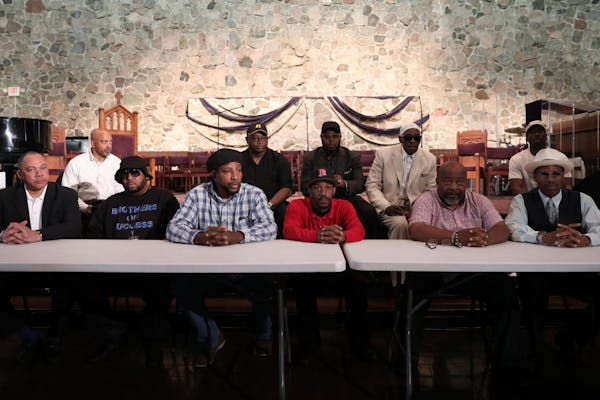Minneapolis, the 1990s are calling, and they want their gangsters back.
The cops and lawyers who have been around the police blotter for a while woke up last week to two names in the news that gave them a deep sense of déjà vu. Sharif Willis and "Johnny the Confessor" Edwards were front-page names during the gang wars in the mid-'90s, when the city was dubbed "Murderapolis."
Their names surfaced again this week, in very different venues. Aging homicide cops, prosecutors and reporters took notice.
It has been just over 20 years since the crime wave of the mid-1990s, so it's not surprising that some of those convicted of serious crimes, including murder, are being released from prison. In 1995 alone, there were 97 killings. Now what?
One of the stories last week was about Willis, a notorious figure in the era as the leader of the Vice Lords. Willis, along with the Rev. Jerry McAfee, ran United for Peace, an organization that attempted to steer youth away from crime.
Willis, just out of prison after serving 25 years, appeared at a news conference last week with McAfee to announce they would again attempt to deter crime on the North Side by reaching out to young gang members. Only now they prefer to call them "subcultural organizations."
They plan a gang summit next month and say Stevie Wonder will speak.
Willis is now 66. The last time he offered his help, he was 44 and out of jail after a murder conviction. It didn't end well.
Initially accepted by some police, United for Peace imploded when Vice Lord members killed officer Jerry Haaf at the Pizza Shack restaurant on E. Lake Street. Police heavily suspected Willis at least knew about the hit. He was eventually convicted on drug and weapons charges after holding people at gunpoint at a service station, accompanied by one of the young men he was allegedly trying to help.
Now Willis is out, and he wants to impress upon young black men that a life of crime always breaks bad. I love a good redemption story, so I hope he's successful this time. Many, however, are skeptical.
"I wish I thought this would work too, but it's not going to," said Mike Martin, vice chairman of the Midwest Gang Investigators Association. Martin, a walking encyclopedia of Minnesota gangs, said that "it's a rehash of United for Peace. It didn't work then, and it won't work now; history and research tells us that.
"A lot of those older gang leaders are getting out of prison and looking to get involved in criminal activities again and to legitimize themselves," Martin added. "We have to be very careful."
The other '90s headliner, Edwards, was a prodigious one-legged snitch who helped convict at least four members of the Rolling 30s gang for murder. He was dubbed "the Confessor" because younger men allegedly confessed their homicides to him. He then turned on them to escape burglary charges.
Defense attorneys accused Edwards of being untrustworthy. After one defendant was found not guilty, I asked a juror why he acquitted the man. "If Johnny Edwards stood up and said he had one leg, I wouldn't believe him," the juror said.
Now 44, and out of prison, Edwards was charged last week with killing someone during a drug deal.
Hennepin County Attorney Mike Freeman was the top prosecutor back in the 1990s, too. He said those old school gangsters being released will have to choose how they lead the rest of their lives. He's cautiously optimistic about Willis, and his reacquaintance with McAfee.
"Jerry continues to fight the fight, behind the scenes and effectively," said Freeman. He said Willis struggled to live between two very different worlds, but ended up succumbing to violence.
"I'm glad to have [Willis] back," Freeman said. "I'm hopeful something good can come of this."
Retired homicide cop Jim DeConcini, however, isn't buying the new summit for a minute. "United for Peace was a great scam for conning naive liberals out of their money," DeConcini wrote in an e-mail, calling this latest attempt "Act II."
Martin doubts old school gang members can influence today's gangs, which are less organized and more impulsive than the past, and he said using the term "subcultural organization" shows they are "not willing to address the actual problem."
"You can't use euphemisms to downplay the negative consequences of gangs in a community," Martin said. "Because of [Willis'] behavior, kids grew up without fathers. The city is still dealing with the aftermath of the '90s, and to see someone just out of prison involved in this is unfathomable."
jtevlin@startribune.com 612-673-1702
Follow Jon on Twitter: @jontevlin

Depressed after his wife's death, this Minneapolis man turned to ketamine therapy for help

Tevlin: 'Against all odds, I survived a career in journalism'




